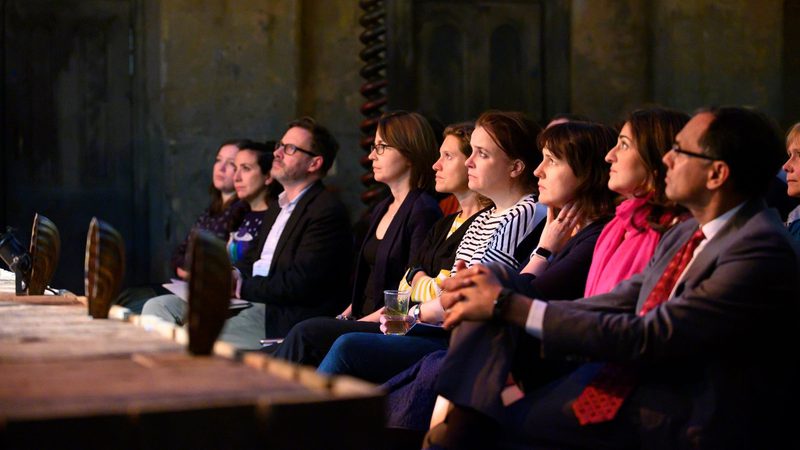5x15 Notting Hill - Environment

Merlin Sheldrake is a biologist and a writer. He received a Ph.D. in Tropical Ecology from Cambridge University for his work on underground fungal networks in tropical forests in Panama, where he was a predoctoral research fellow of the Smithsonian Tropical Research Institute. He is a research associate of the Vrije University, Amsterdam, and sits on the advisory board of the Fungi Foundation and the Society for the Protection of Underground Networks. Winner of the Royal Society Science Book Prize and the Wainwright Prize, and named a Book of the Year in The Times, Daily Telegraph, Sunday Times, New Statesman and Time, among others, his first book Entangled Life has been translated into thirty languages since its publication. It has now been reissued in a brand new illustrated edition, with over 100 spectacular full-colour images showcasing this wondrous lifeform as never before.
Wade Davis is a writer, photographer, and filmmaker whose work has taken him from the Amazon to Tibet, Africa to Australia, Polynesia to the Arctic. Explorer-in-Residence at the National Geographic Society from 1999 to 2013, he is currently Professor of Anthropology and the BC Leadership Chair in Cultures and Ecosystems at Risk at the University of British Columbia. Author of 20 books, including One River, The Wayfinders and Into the Silence, winner of the 2012 Samuel Johnson prize, the top nonfiction prize in the English language, he holds degrees in anthropology and biology and received his Ph.D. in ethnobotany, all from Harvard University. His many film credits include Light at the Edge of the World, an eight-hour documentary series written and produced for the National Geographic Channel. Davis is the recipient of 11 honorary degrees, as well as the 2009 Gold Medal from the Royal Canadian Geographical Society, the 2011 Explorers Medal, the highest award of the Explorers’ Club, the 2012 David Fairchild Medal for botanical exploration, the 2015 Centennial Medal of Harvard University, the 2017 Roy Chapman Andrews Society’s Distinguished Explorer Award and the 2017 Sir Christopher Ondaatje Medal for Exploration. In 2016, he was made a Member of the Order of Canada.
Architect and author Carolyn Steel uses food as a medium to "read" cities and understand how they work. In her book Hungry City she traces – and puts into historical context – food’s journey from land to urban table and thence to sewer. Cities, like people, are what they eat. The question of how to feed cities may be one of the biggest contemporary questions, yet it's never asked: we take for granted that if we walk into a store or a restaurant, food will be there, magically coming from somewhere. Yet, think of it this way: just in London, every single day, 30 million meals must be provided. Without a reliable food supply, even the most modern city would collapse quickly. And most people today eat food of whose provenance they are unaware. How is the city transformed around food? And how can we transform it into a city utopia in the future?
Nick Crane is an award-winning writer, journalist, geographer and explorer, as well as the presenter of the prime-time BAFTA-winning BBC TV series Coast, Great British Journeys, Map Man and Town. Born in Norfolk, his career has seen him travel extensively in Tibet, China, Afghanistan and Africa. He also identified and visited for the first time the geographical Pole of Inaccessibility, the point on the globe most distant from the open sea, located in the Gobi Desert. In Latitude, he tells the greatest true scientific adventure story yet to be heard: the story of the world’s first ever international scientific expedition, which aimed to discover the shape and magnitude of the earth. An epic tale of survival and science in the 18th century spanning ten years, oceans and continents, volcanoes and rainforests, mutiny and murder, it details the breakthroughs in scientific discovery that define the world we know today.
Zing Tsjeng is a journalist from London, where she currently works as the UK editor of Broadly, VICE’s channel for millennial women. She has also written about feminism, arts and culture, politics, race and LGBTQ identity for publications like the Guardian, Buzzfeed, Dazed, i-D magazine and the Debrief. Zing is also a presenter for VICE, and her most recent documentary (Britain First vs Antifascists vs Police) attracted 1.5 million views on Facebook. She is also a keen speaker and panelist, and has appeared on BBC Woman’s Hour and moderated live events at the BFI, SXSW, Web Summit and HowTheLightGetsIn festival. In 2017 she was nominated for the Pride Power List, which celebrates the achievements of influential lesbian, gay, bisexual and transgender people. Zing is the author of the feminist series, Forgotten Women, published by Octopus.
Patrick Barkham is the natural history writer for the Guardian. He is the author of the books The Butterfly Isles, Badgerlands, Coastlines, Islander and Wild Child. He has been interviewed on Radio 4 and Radio 2 and has written for a wide range of media outlets, as well as co-editing the ‘People’s Manifesto for Wildlife’ with Chris Packham and Robert Macfarlane. He lives in Norfolk with his family.





